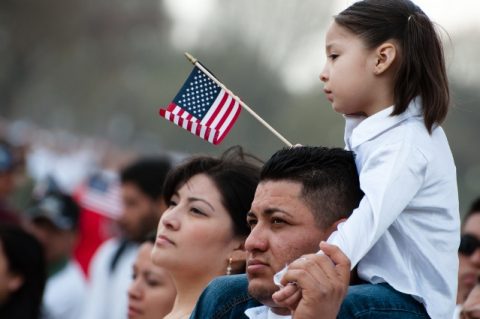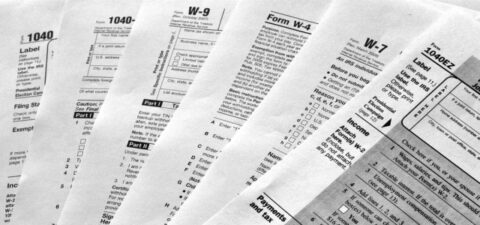Immigration Reform

Opposition Builds To Limited Proposal That Would Offer Citizenship Only To DREAMers
So far, House leaders have considered providing an opportunity for citizenship only to undocumented immigrants who arrived in the U.S. as children, often known as DREAMers. Majority Leader Eric Cantor (R-VA) and Judiciary Committee chairman Bob Goodlatte (R-VA) confirmed earlier this month that they are working on a bill, called the KIDS Act, to create a road to citizenship for some DREAMers. "These children came here through no fault of their own and many of them know no other home than the United States,” Goodlatte said in a statement. Read More

Immigration Reform an Imperative for Cities and Metropolitan Areas
Metropolitan leaders from around the country made the case for immigration reform at an event hosted by the Brookings Institution’s Metropolitan Policy Program today. Over 80 percent of the U.S. population, including 95 percent of immigrants, now live in metropolitan areas; cities and towns across the country therefore have a huge stake in passing immigration reform. In fact, panelists agreed that comprehensive immigration reform is an imperative for metropolitan areas. “We need an immigration system that is keeping with the times,” stated Audrey Singer, a Senior Fellow with Brookings. Read More

Immigration Reform Fattens State Economies, Too
“Should the United States be pro-immigrant?” asked Tax Watchdog Grover Norquist. “That’s like asking whether McDonald’s should make hamburgers. It’s made the United States work for several hundred years. It’s what’s made us different, what’s made us more successful,” said Norquist during a recent call summarizing a new report from Regional Economic Models, Inc. (REMI) on the economics of immigration reform. Read More

Faith Groups Make The Religious Argument For Immigration Reform
As the focus on immigration reform turns to the House of Representatives, faith leaders continue to push for members of Congress to support a comprehensive measure to improve immigration policies. In late May, evangelical groups launched a $250,000 national ad campaign that featured pastors urging people to support congressional immigration reform efforts. And after the Senate passed S. 744, four religious organizations sent letters to House members pushing them to act on comprehensive immigration legislation. Read More

USCIS Approves First Green Cards for Same Sex Couples
On June 26, the Supreme Court issued its decision in the case of United States v. Windsor, in which it struck down section 3 of the Defense of Marriage Act (DOMA), which defined marriage as between a man and a woman for all federal laws. This law meant that the immigration agencies would not recognize lawful, same-sex marriages for any immigration purpose. Since the Court’s decision, the Obama administration has moved rapidly to allow U.S. citizens to petition for immigration benefits for their spouses, providing hope to an estimated 28,500 bi-national same-sex couples in the United States who might otherwise be separated by our immigration laws. Read More

New Estimates of State and Local Taxes Paid by Undocumented Immigrants
Undocumented immigrants who live and work in the United States pay billions of dollars in taxes every year to state and local governments. Given the chance to earn legal status, they would pay even more. Those are the simple yet powerful conclusions of a new study by the Institute on Taxation and Economic Policy (ITEP). According to ITEP, “undocumented immigrants paid an estimated total of $10.6 billion in state and local taxes in 2010.” Moreover, “allowing undocumented immigrants to work in the United States legally would increase their state and local tax contributions by an estimated $2 billion a year.” In short, legalization pays. Read More

DREAMers Push For A Path To Citizenship
Ahead of a Wednesday meeting of House Republicans to discuss various options on immigration reform, hundreds of DREAMers—young immigrants who arrived in the U.S. as children—held their own version of a citizenship ceremony and rally yesterday to push for legislation that will provide a roadmap to citizenship for not only themselves but for millions of other undocumented immigrants as well. “We have come today to claim our citizenship,” said United We Dream’s Lorella Praeli. “2013 is not the time for separate but equal. It is not the time for legalization for some and citizenship for others.” Read More

White House Report Outlines the Economic Benefits of Immigration Reform
As Republicans in the House of Representatives search for a way forward on immigration reform, they should keep in mind a critical point: overhauling the U.S. immigration system would help jump start the sluggish U.S. economy. In other words, any Member of Congress who has expressed a desire to cut the federal budget deficit, create new jobs and businesses, boost wages, and increase U.S. economic output should be for immigration reform—not against it. Conversely, those who stand against reform should carefully consider the price that will be paid by the U.S. economy, and U.S. workers, if reform does not occur. Read More

The Civics Lessons Many Undocumented Immigrants Have Already Learned
If the Senate’s comprehensive immigration reform bill becomes law, many undocumented immigrants who apply for and become Registered Provisional Immigrants (RPIs) would have to pass an English and civics test before becoming Lawful Permanent Residents (LPRs). These tests are administered so New Americans can show their commitment to this country by demonstrating that they speak English and understand the basic tenets of our democracy. Although the test is a formal set of questions about American democracy—How many branches of government? Who was the first President? What is the Declaration of Independence?—the work leading up to passage of the Senate bill was itself a lesson in democracy. For many immigrants who may one day be RPIs, their participation in efforts to pass legislation shows that they have already participated in their first civics lesson. Read More

Immigrants are Key Driver of U.S. Talent and Economic Competitiveness
U.S. workers in science, technology, engineering, and mathematics (STEM) fields have been important contributors to American innovation, job creation, rising incomes, and global economic competitiveness throughout the years. And not surprisingly, immigrants have played a critical role in American innovation through STEM fields and all parts of the U.S. economy. A new report by Gordon Hanson (University of California, San Diego) and Matthew Slaughter (Dartmouth) describes these important relationships between talent, economic competitiveness, and immigration in the United States. In their paper, the authors present data in support of three critical points: Read More
Make a contribution
Make a direct impact on the lives of immigrants.
